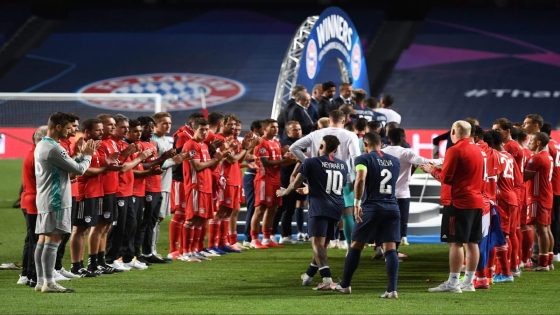Four years ago, in 2020, Bayern Munich beat Paris Saint-Germain 1-0 in the Champions League final. Tonight, they meet for the third time since.
Those four years — an Olympic cycle, a World Cup cycle — is a period of time that lends itself to assessing how the two clubs, which share as many similarities as differences, have changed.
They were the two losing Champions League semi-finalists last season: PSG to Borussia Dortmund (eventual runners-up) and Bayern to Real Madrid (winners).
Neither have had the disgrace of being grouped over those four years, but neither have made a final since that 2020 final in Lisbon, with a combined five exits in the round of 16/quarter-finals. Good in the groups, not great in the knockouts.
Each have won three of the last four league titles. It’s three in a row for PSG, after Lille won Ligue 1 in 2020-21. Last season, Bayer Leverkusen romped to the Bundesliga title to end Bayern’s 11-year run of first-place finishes.
If you want a sense of recent imperfections of two teams who mostly cruise to titles but are strangely beatable in their domestic cup, the three post-final match-ups feature different head coaches on both sides.
Mauricio Pochettino’s PSG eliminated a Hansi Flick Bayern side (on away goals) in the 2020-21 Champions League quarter-finals. Two seasons later, Julian Nagelsmann’s Bayern won both legs, 2-0 in Paris then 1-0 in Munich, over Christophe Galtier’s PSG.
This time, it’s Vincent Kompany up against Luis Enrique, in a fixture which has the quirk of being played 13 times and never drawn — the most-played European fixture for both clubs where every game has had a winner.
ClubElo ratings quantify their changes in form over time and is a more reliable way of cross-division comparisons. It’s a scoring method from chess, which allocates points when teams win, with more points for beating a better team. The higher the rating, the more superior you are.
Since the 2020 final, Bayern enjoyed an uptick before trending downwards from 2021. PSG have undulated, to the extent that they’re about the same level.

On the pitch, they look similar. Kompany’s desire for pressing intensity is inspired by how Bayern defended under Pep Guardiola, while Luis Enrique never likes his teams being out of possession. Consequently, they share defensive principles, taking plenty of risk with player-for-player pressing schemes.
Compare Bayern in white below…
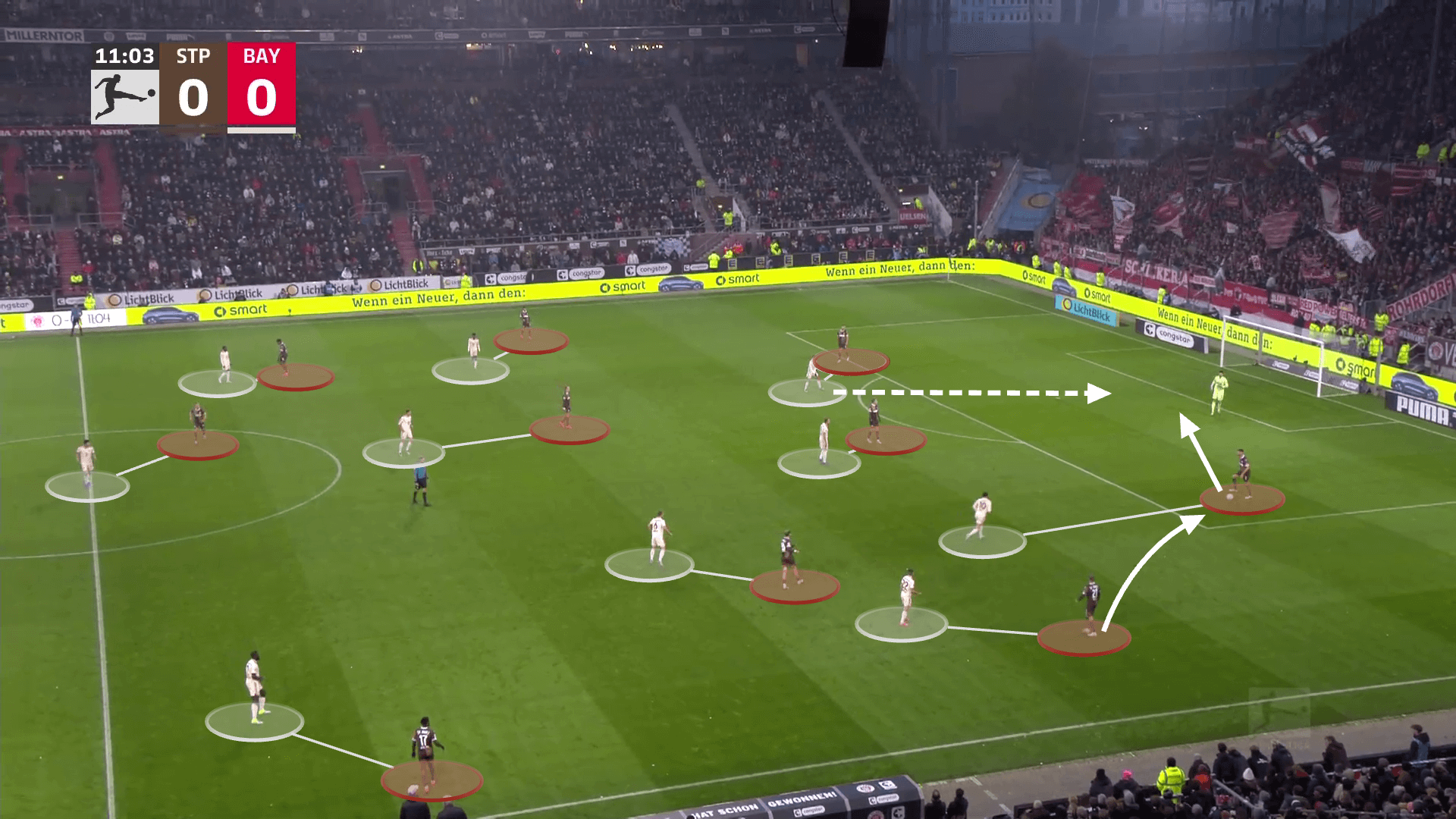
… with PSG in Pink below.
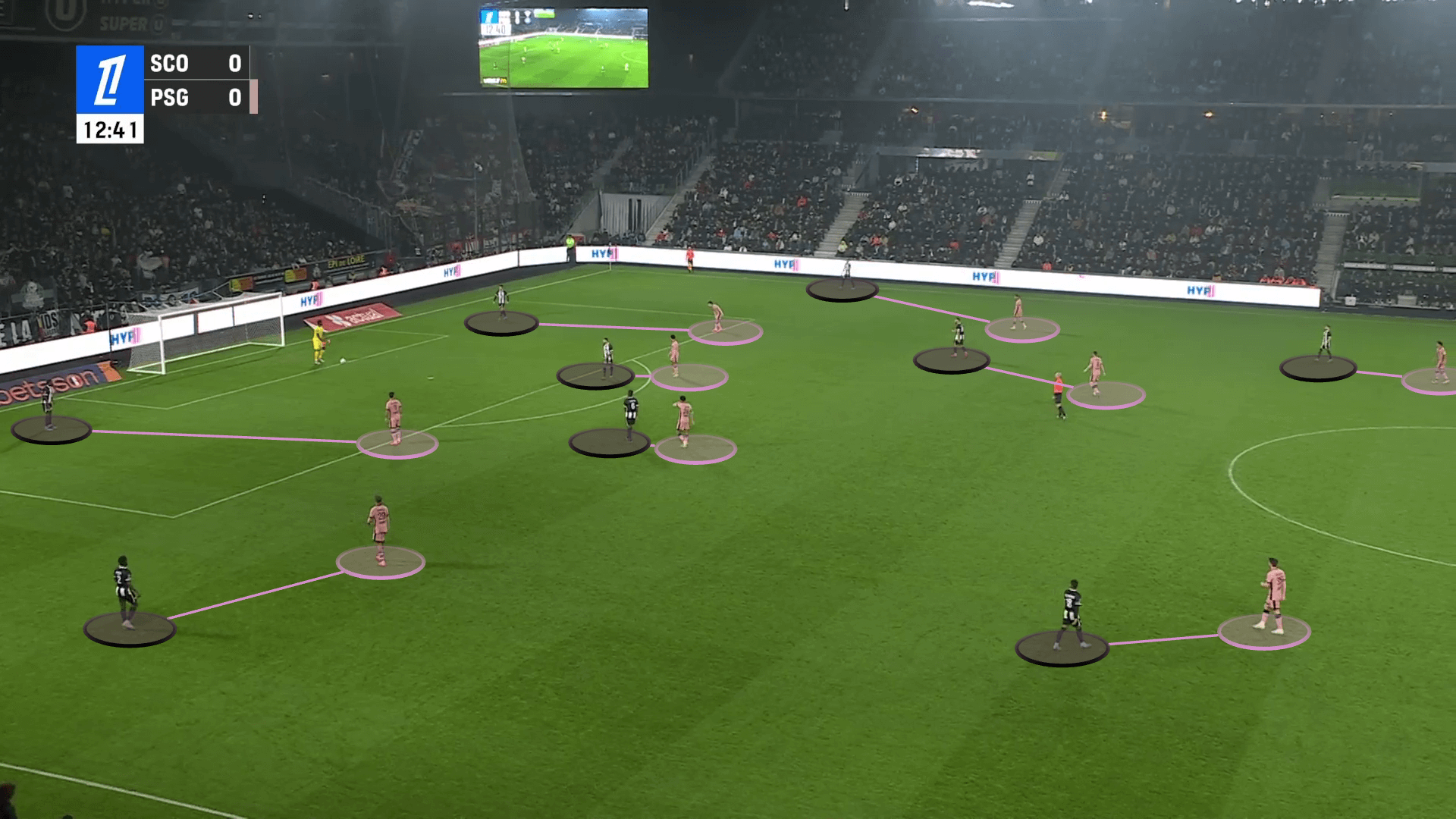
Such approaches are easier to implement (and execute) in their domestic leagues compared to Europe, admittedly, but Luis Enrique and Kompany, despite being at different places in their coaching careers, are equally dogmatic.
Luis Enrique is a former Barcelona player and coach in every sense, while Vincent Kompany played 62 times for Guardiola in his final seasons at Manchester City. The critique of Kompany’s Burnley last season was that they were relegated by trying to play too much like City, and that he failed upwards into the Bayern job.
They’re the top two teams for average possession in Europe’s top five leagues this season: Bayern, 71.5 per cent; PSG, 68.2 per cent. When they meet tonight, it’ll likely be 4-3-3 (PSG) versus 4-2-3-1 (Bayern) and both teams shift into a back three in build-up, though in different ways.
PSG tuck their left-back in and push right-back Achraf Hakimi upfield, either into the half-space or high and wide, depending on right winger Ousmane Dembele’s position.
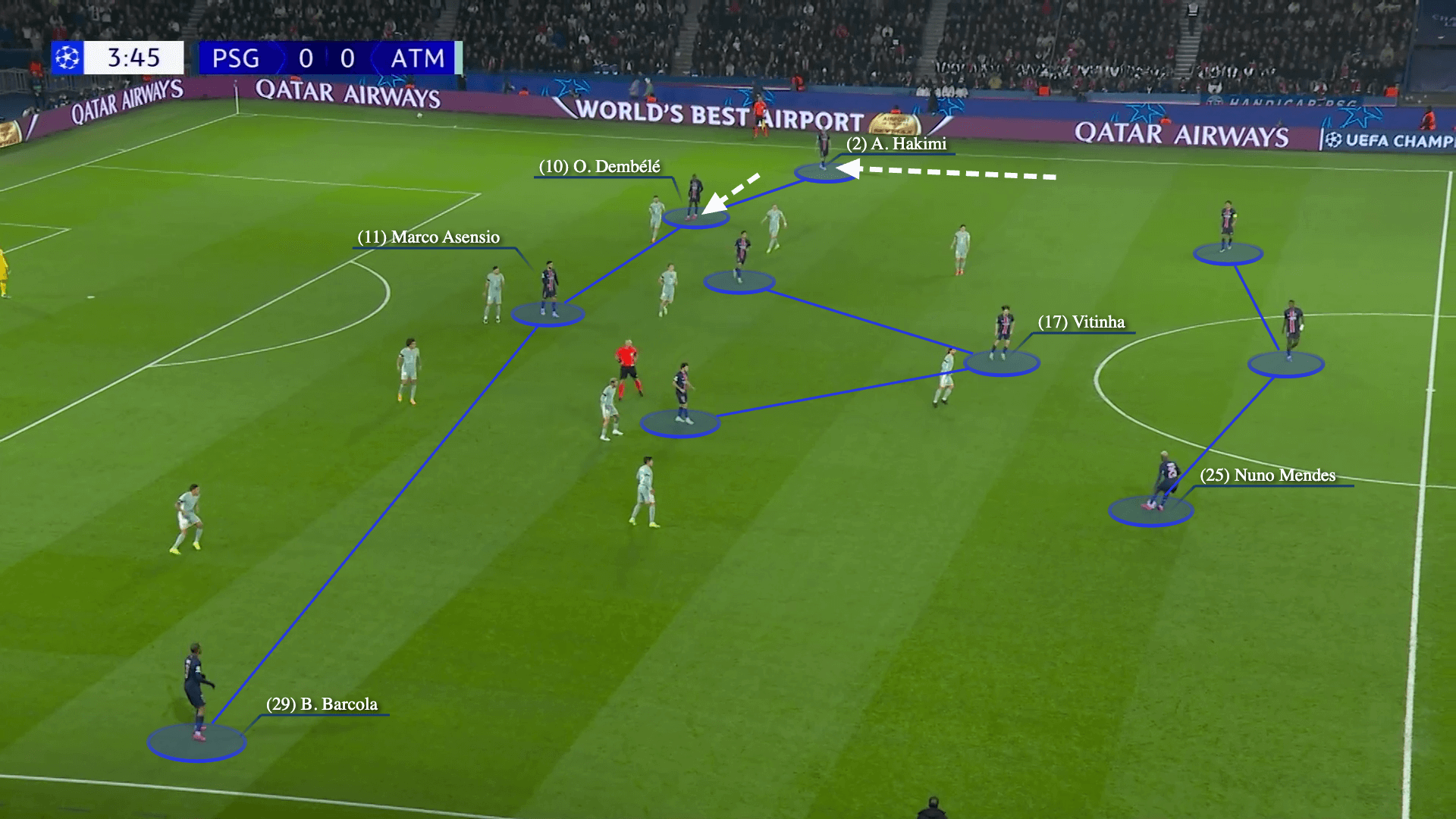
Bayern are more varied, sometimes dropping a pivot between the centre-backs (Joao Palhinha does this in particular, but he is out injured). Expect central midfielder Joshua Kimmich to rotate out to right centre-back, which allows both full-backs to play aggressively and create a front five, with narrow wingers.
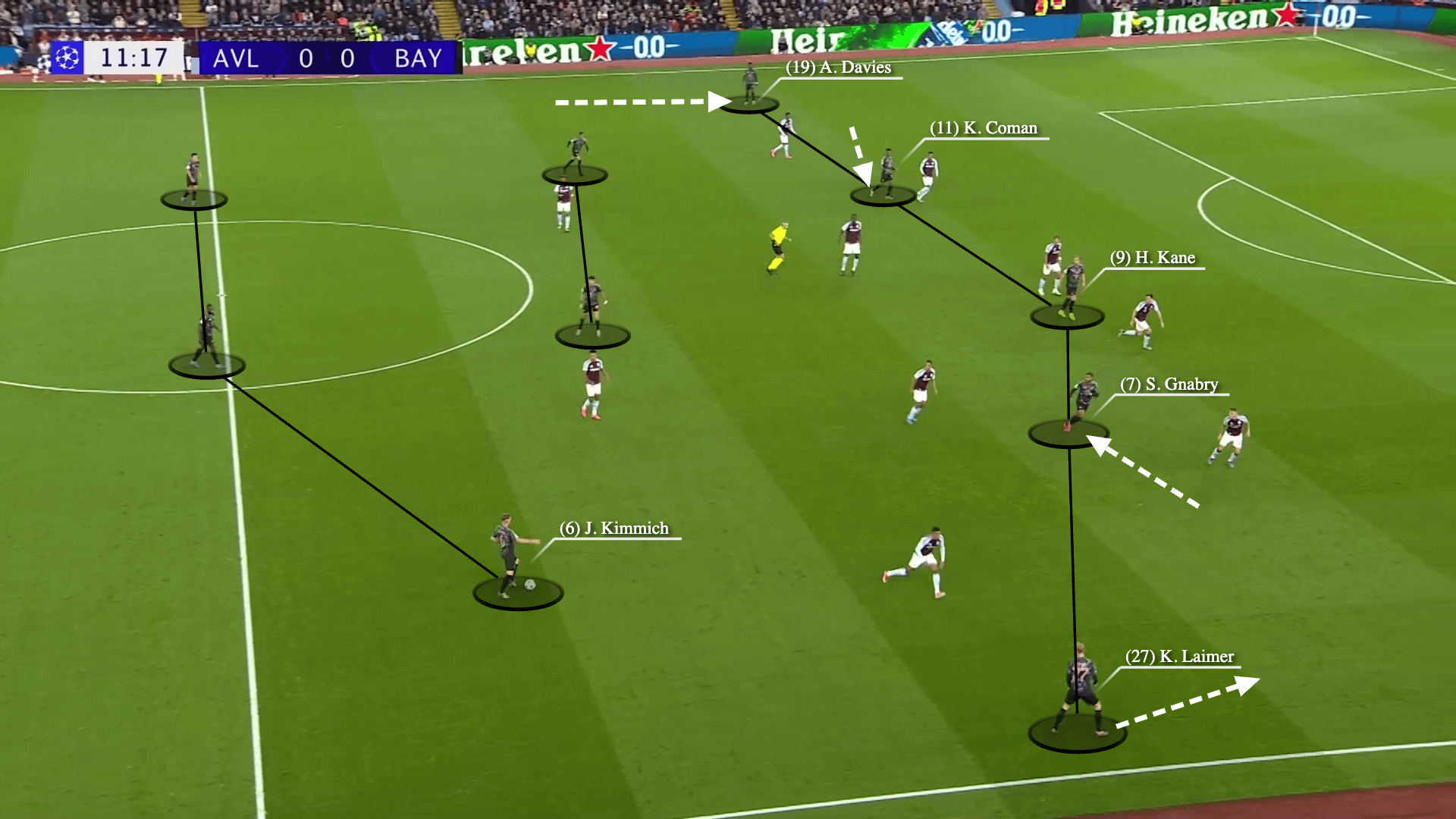
The real attacking difference is the No 9. Bayern have Harry Kane there, and while he has a tendency to drop in, the England international has scored the most goals of any player in Europe’s top five leagues since the start of last season (50). He’s a penalty-box goalscorer.
Luis Enrique, meanwhile, persists with a strikerless system, having fielded Lee Kang-in, Marco Asensio and Dembele (all midfielders/wingers) in false nine roles. The contrasts of having Kane and Lee at the top of the pitch reflect differences in squad building and recruitment.
PSG have moved on from their galacticos approach, prioritising youth and Parisien — or at least French — talent. Ironically, Bayern’s Champions League-winning goal in 2020 was scored by Kingsley Coman, a Paris-born, PSG academy graduate.
They’re the second-youngest team in Ligue 1 this season (24.0 average age, behind only Strasbourg’s 21.9). Since Luis Enrique’s arrival at the start of 2023-24, PSG have paid a transfer fee for 15 players — 12 were aged 24 or younger.
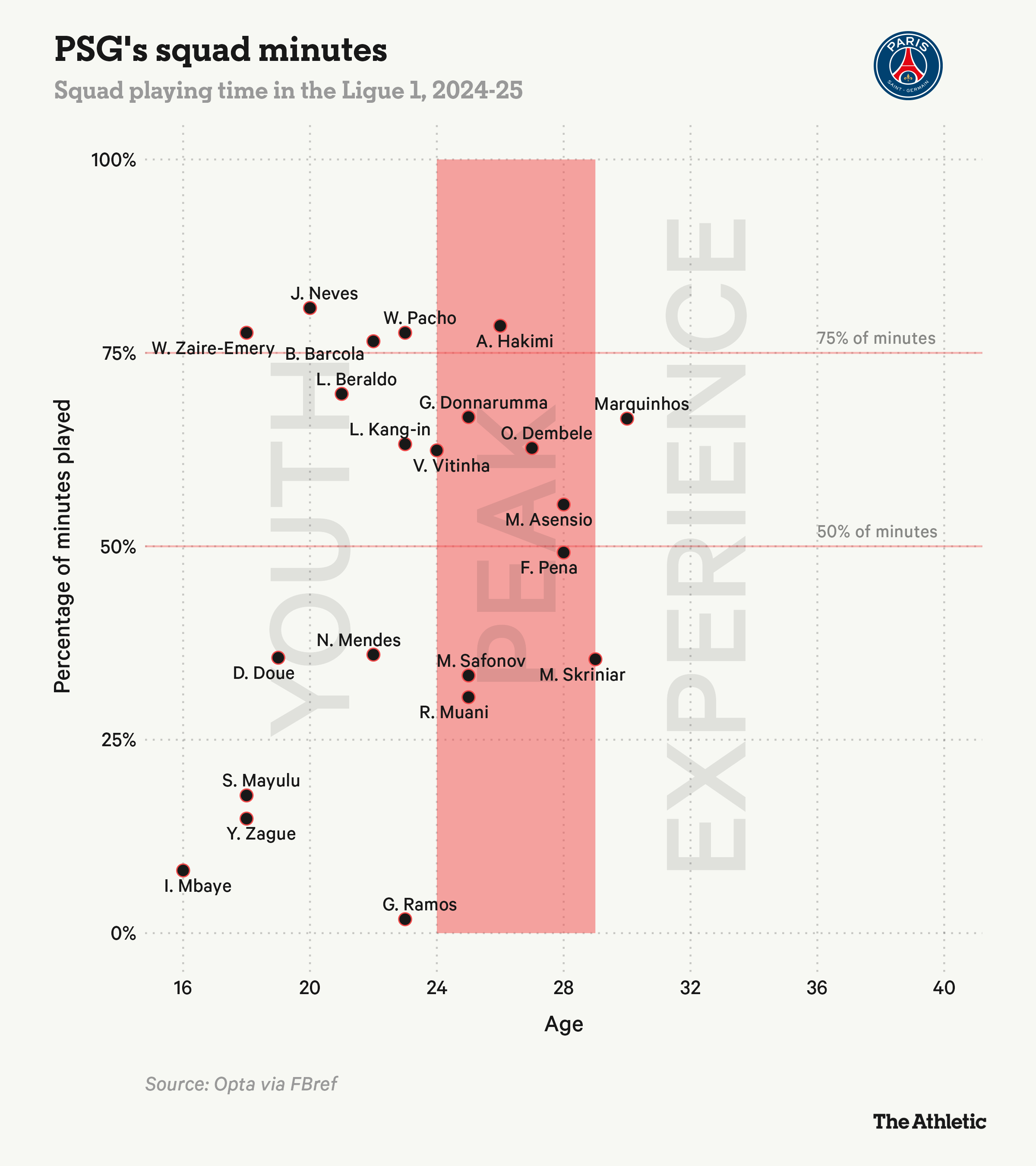
Their overhaul is clearest when looking at the teams from the first leg of the quarter-final meeting in 2021-22. Centre-back pairing Marquinhos and Presnel Kimpembe are the only remaining players from that 23-man PSG squad.
Comparatively, five of Bayern’s starting front six from that game are still first-team regulars: midfield duo Kimmich and Leon Goretzka, wingers Coman and Leroy Sane, and No 10 Thomas Muller. Eric-Maxim Choupo-Moting, who Bayern only released this summer, was the No 9.
As per CIES, a football data research group, Bayern’s starting XIs this season feature players who, on average, have been at the club 59 months (almost five years). That makes them the most stable team for player longevity in Europe’s major leagues, and they’re the second-oldest in the Bundesliga (28.2 average age, behind Bochum’s 28.4).
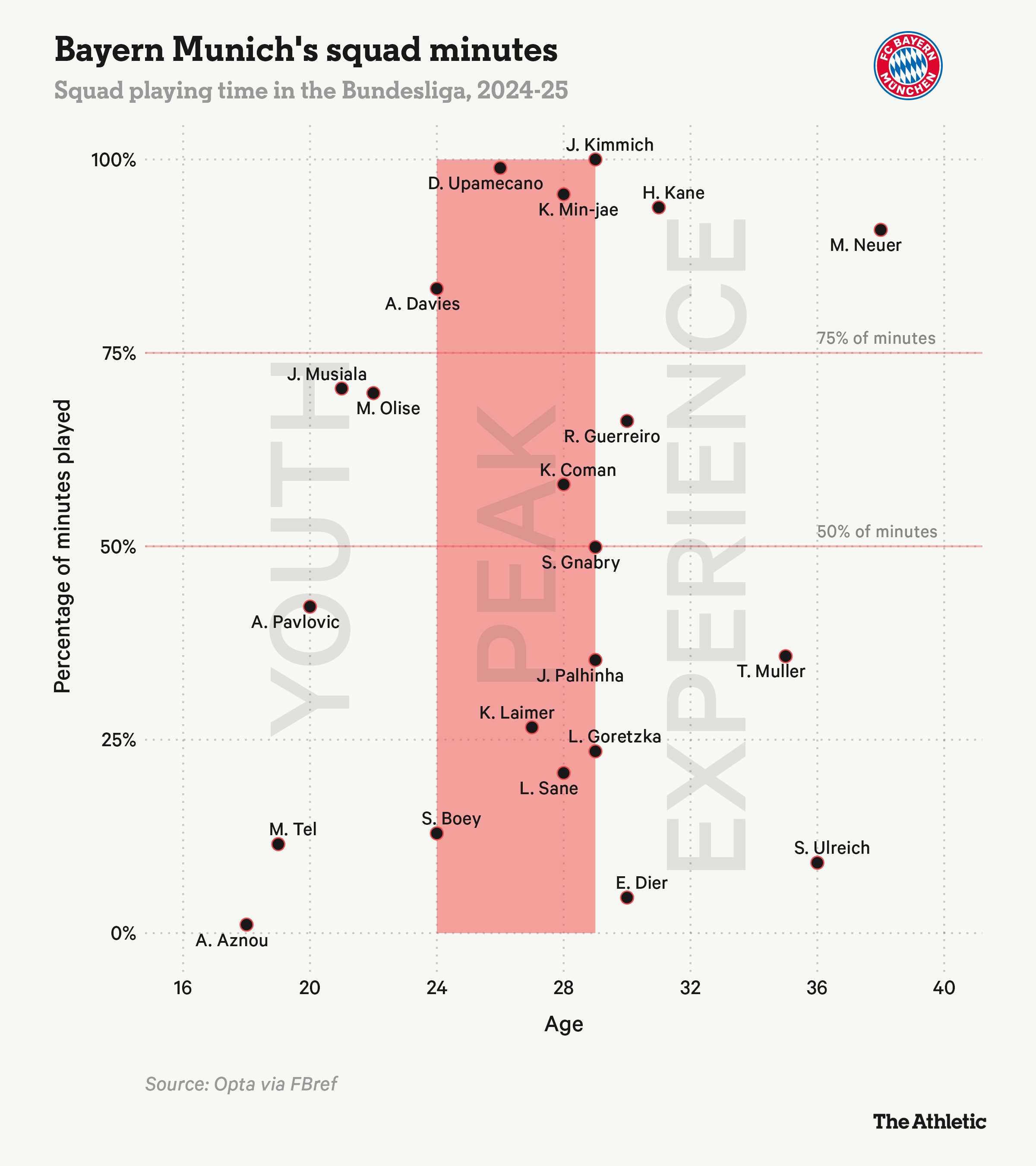
Bayern look to be treading the same path that PSG did, just a few years later on. They changed their board structure and personnel in 2023, appointing two former RB Leipzig employees in Max Eberl (director of sport) and Christoph Freund (sporting director). Part of their remit is to bring in younger talent and move away from primarily signing stars. Sound familiar?
The contrasts of league and European form for both sides this season are symptomatic of their recent problems. PSG and Bayern are unbeaten after 12 and 11 league games respectively, the top two in Europe’s top five leagues for points per game.
It’s the second time in the last six seasons (2022-23 being the other occasion) that PSG are unbeaten at this stage, but notably they’ve scored 36 goals, their most in six seasons, and nine of their 10 wins have been by two or more goals. There’s some opposition quality to factor in (they haven’t played Monaco nor Lyon yet) but despite Kylian Mbappe’s summer move to Real Madrid, PSG have clicked.
Comparatively, Bayern have made an identical league start to last season (nine wins and two draws from the opening 11) and are putting teams away even more than PSG — six of their wins have been by three or more goals.
There’s everything to suggest both teams, with aggressive out-of-possession strategies, dominant attacking approaches and relative individual quality (to the rest of their league), should canter to league titles. Yet both are struggling in Europe.
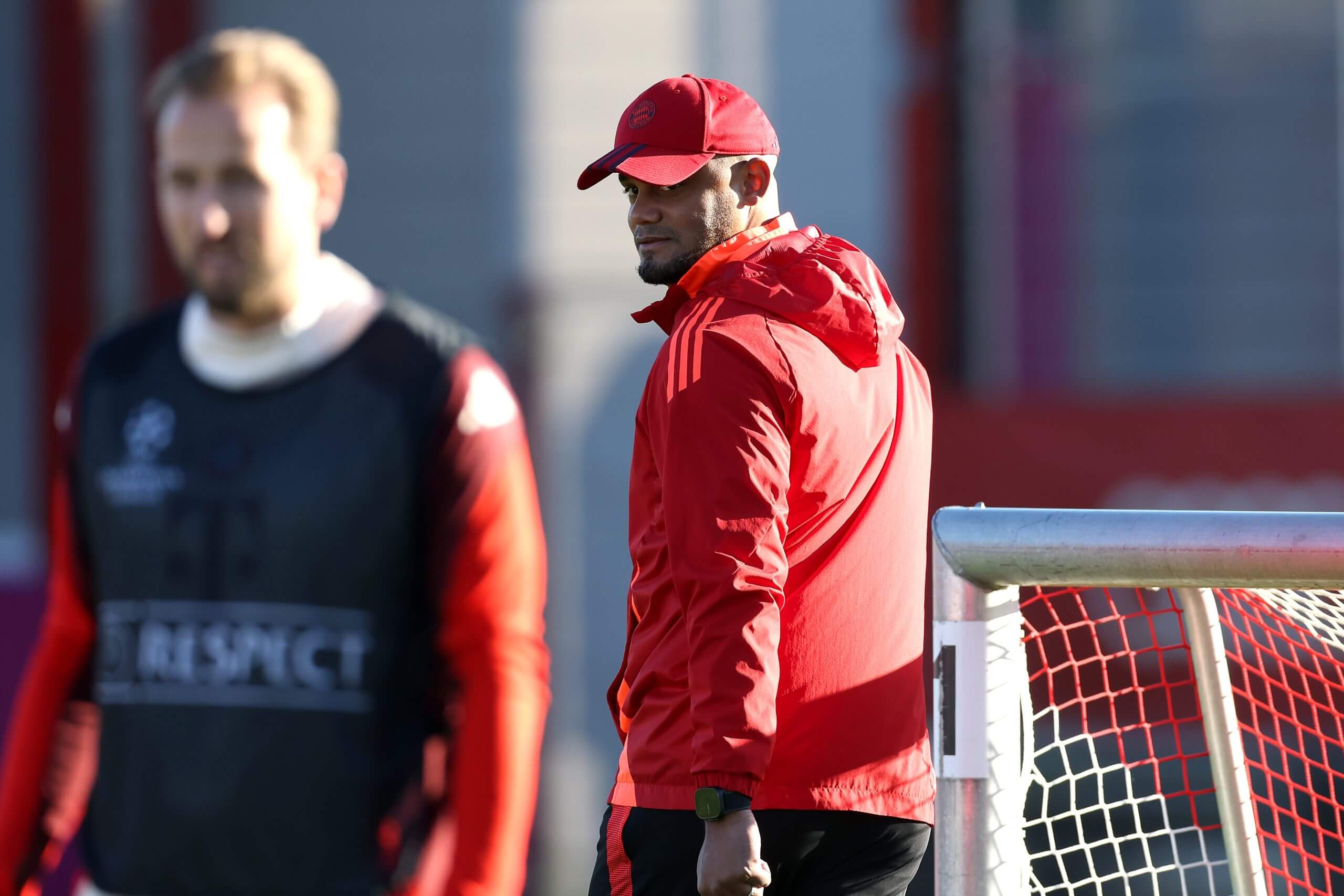
Bayern are on six points and PSG four, sitting 17th and 25th. Opta’s simulations predict that 10 points will be enough for a top-24 spot, though really both should be targeting a top-eight finish to avoid the play-off round. Fifteen points is the expected threshold, which requires perfection from PSG in their final four league games, and Bayern need three wins. Near perfection.
Luis Enrique has repeatedly called PSG “unlucky” and pointed out they have, statistically, the hardest fixture list. They’ve been the most wasteful finishers (underperforming their expected goals by five and only scoring nine per cent of big chances) and part of that ties back into their profiles and style.
“We need 20 clear chances to score. The opposition sneeze and score. It’s the same dynamic every time,” said the PSG head coach after Atletico Madrid’s 2-1 smash-and-grab in Paris earlier this month.
The strikerless system is much easier to apply in Ligue 1, where defences are younger, more inexperienced, less physical and of lower individual/collective quality. In Europe, PSG face plenty of low blocks and, at times, need a Kane-like No 9 who can be an aerial threat at crosses and duel against centre-backs.
Goncalo Ramos has been that, especially as a substitute, but he’s not played since matchday one due to an ankle injury. After the defeat by Atletico, Luis Enrique was asked about playing a traditional No 9, having started Asensio.
“Bring him to me, if you have him. Where do I get this striker from? I’m sticking to my ideas. The day I fail will be with my ideas, not those of a journalist or another coach.” Classic Luis Enrique, really. Plan B is to do Plan A better.
Bayern, too, have their problems, particularly in defensive transition. Overall, their numbers are OK but that’s because they do a lot of defending with the ball. Bayern are giving up the highest-quality shots on average (0.16xG/shot) in the Champions League.
Those frailties were exposed in their 1-0 defeat away at Aston Villa, as they played with aggressively high full-backs and made plenty of midfield rotations.
That makes PSG’s counter-attack — as much as Luis Enrique will want to win with “his (possession) ideas” — a pivotal part of the match. The dribbling quality and pace of Bradley Barcola and Dembele are important here.
PSG’s 21 direct attacks are the most in the Champions League this season. Opta define those as regains in a team’s own half, with at least 50 per cent forward movement, ending in a shot or touch in the opposition box.
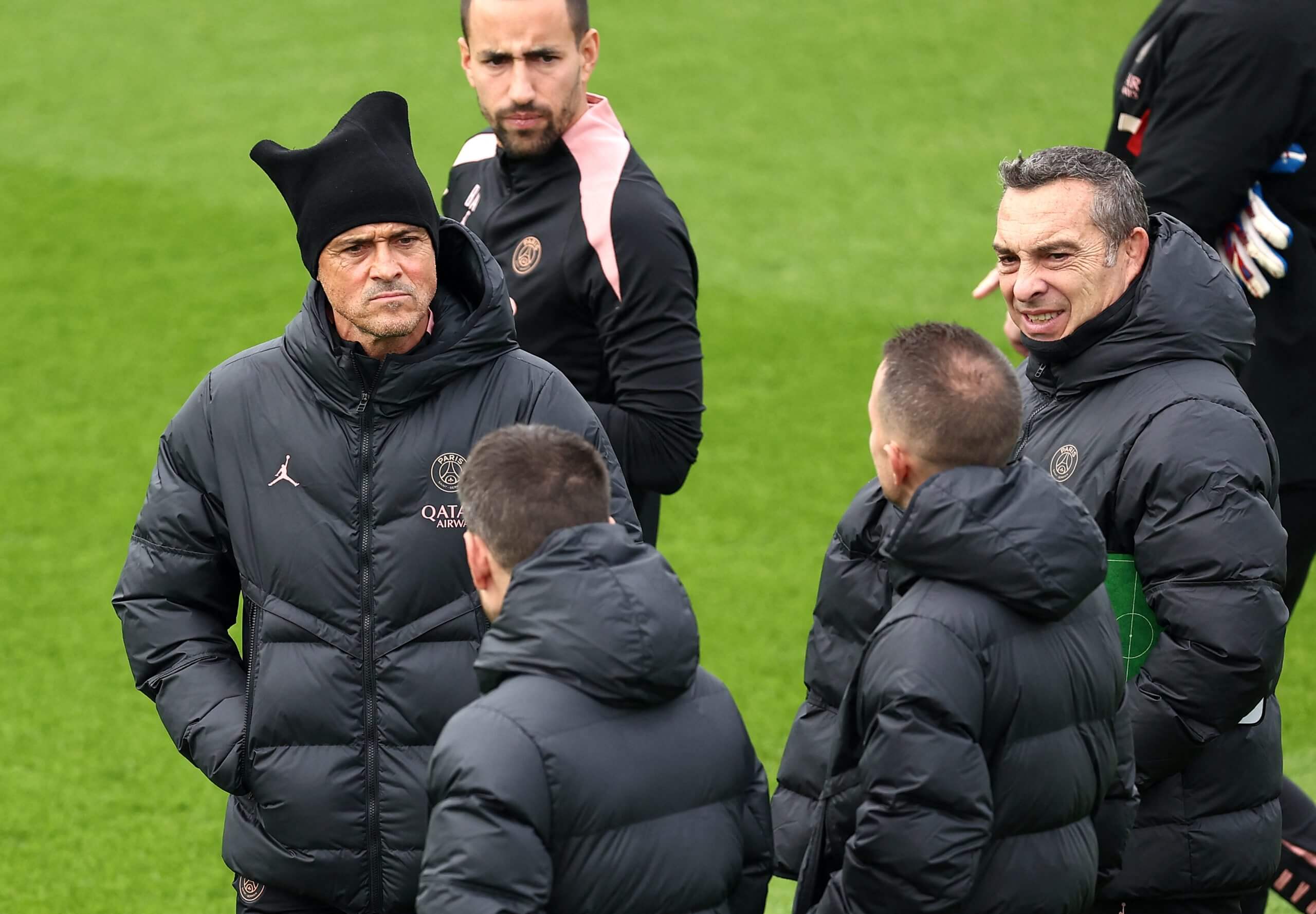
The two clubs are stuck between a rock and a hard place. Bundesliga and Ligue 1 games, as tests of quality and tactics, have limited use for European preparation.
Their efforts to solve that have manifested in two very different recruitment and squad-building approaches, and yet there’s plenty of tactical overlap.
They’ve both tried the avenue of a notorious tournament head coach in Thomas Tuchel, and moved onto a much more idealistic one.
PSG and Bayern have very different pressures, but both share one big problem: getting back to the Champions League final.
A win for one of them tonight will keep their knockout-round hopes alive, and massively damage the hopes of their opposition.
(Top photo: Bayern’s players clap those of PSG after defeating them in the Champions League final in 2020; by David Ramos/AFP via Getty Images)
